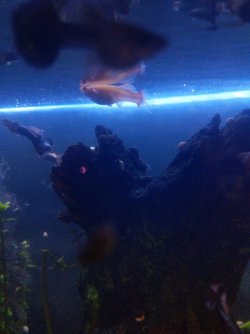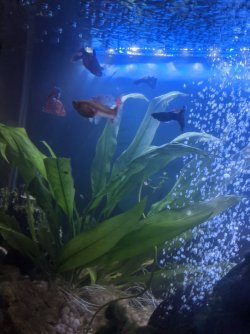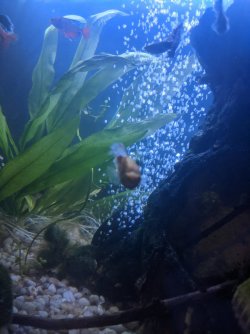Was her tail normally red where it is now?
It's probably just physical damage caused by being caught in the plants and panicking.
-----------------------
Wipe the inside of the glass down with a clean fish sponge.
Do a 75% water change and gravel clean the substrate every day for a week. The water changes and gravel cleaning will reduce the number of disease organisms in the water and provide a cleaner environment for the fish to recover in.
Make sure any new water is free of chlorine/ chloramine before it is added to the tank.
Clean the filter if it hasn't been done in the last 2 weeks. However, if the filter is less than 6 weeks old, do not clean it. Wash the filter materials/ media in a bucket of tank water and re-use them. Tip the bucket of dirty water on the garden/ lawn.
Increase surface turbulence/ aeration when using salt or medications because they reduce the dissolved oxygen in the water.
Add salt, (see directions below).
If it gets worse, post more pictures.
-----------------------
SALT
You can add rock salt (often sold as aquarium salt), sea salt or swimming pool salt to the aquarium at the dose rate of 1 heaped tablespoon per 20 litres of water. If there is no improvement after 48 hours you can double that dose rate so there is 2 heaped tablespoons of salt per 20 litres.
If you only have livebearers (guppies, platies, swordtails, mollies), goldfish or rainbowfish in the tank you can double that dose rate, so you would add 2 heaped tablespoons per 20 litres and if there is no improvement after 48 hours, then increase it so there is a total of 4 heaped tablespoons of salt per 20 litres.
Keep the salt level like this for at least 2 weeks but no longer than 4 weeks otherwise kidney damage can occur. Kidney damage is more likely to occur in fish from soft water (tetras, Corydoras, angelfish, Bettas & gouramis, loaches) that are exposed to high levels of salt for an extended period of time, and is not an issue with livebearers, rainbowfish or other salt tolerant species.
The salt will not affect the beneficial filter bacteria but the higher dose rate (4 heaped tablespoons per 20 litres) will affect some plants and some snails. The lower dose rate (1-2 heaped tablespoons per 20 litres) will not affect fish, plants, shrimp or snails.
After you use salt and the fish have recovered, you do a 10% water change each day for a week using only fresh water that has been dechlorinated. Then do a 20% water change each day for a week. Then you can do bigger water changes after that. This dilutes the salt out of the tank slowly so it doesn't harm the fish.
If you do water changes while using salt, you need to treat the new water with salt before adding it to the tank. This will keep the salt level stable in the tank and minimise stress on the fish.





